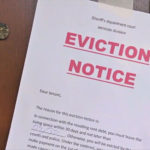A reference of Delaware Eviction Laws, and steps of the Delaware eviction process for landlords and renters, updated 2021.
- What are the reasons that landlords can evict tenants under Delaware eviction laws?
- Non-payment of rent (Del. Code Title 25. Property § 5502).
- Material non-compliance with the lease agreement (Del. Code Title 25. Property § 5513).
- Abandonment (Del. Code Title 25. Property § 5507).
- Tenant remains in possession of the dwelling unit after the occupancy period without the landlord’s permission (Del. Code Title 25. Property § 5106).
- What notice do Indiana eviction laws require that landlords provide tenants before starting the eviction process?
- For evictions based on non-payment of rent, the landlord must give a 5-day notice to the tenant to pay rent before starting the eviction process. (Del. Code Title 25. Property § 5502).
- For evictions based on material lease violations, the landlord must give a 7-day notice of non-compliance before beginning the eviction process. The tenant will have an opportunity to correct the violation during this time, if possible. (Del. Code Title 25. Property § 5502). However, if the tenant lives in a rental room that is part of the landlord’s own residence and the landlord rents out three or fewer rooms, the landlord can give immediate notice to the tenant. (Del. Code Title 25. Property § 5512).
- For evictions based on a holdover tenancy, landlords must provide a 60-day notice to end the tenancy. (Del. Code Title 25. Property § 5106).
- Do Delaware eviction laws allow landlords to use “self-help eviction” methods, such as locking a tenant out of the rental unit or shutting off the utilities?
- No. Delaware law forbids landlords from using self-help eviction methods. Violating this law can result in the landlord owing three times the amount of damages the tenant suffered or the daily amount of rent for each day the tenant was wrongfully excluded from the rent, whichever is greater, as well as court costs but not attorney’s fees. (Del. Code Title 25. Property § 5313).
Delaware Eviction Process
Landlords must comply with the following steps to lawfully evict a tenant in Delaware:
- Provide Written Notice. To initiate the Delaware eviction process, the landlord must serve the appropriate eviction notice to the tenant. The notice must state the reason for eviction, the time limit to remedy the situation, if possible, and what the tenant can do to remedy the situation, if applicable.
- File a Summary Possession Action. The eviction process is known as a Summary Possession Action in Delaware. You can learn more about the process by reading the Summary Possession Action Informational Packet. Landlords begin the judicial process by filing a Complaint and Summons.
- Serve the Court Documents. The landlord must legally serve the tenant with the court documents to notify them of the case and to give them an opportunity to respond.
- Attend the Court Hearing. If the tenant does not respond to the court documents, the landlord can request a default judgment. If the tenant does respond, the tenant and landlord attend the court hearing and present their case to the court.
- Complete a Writ of Possession. If the landlord wins the case, they can ask the court for a Writ of Possession, which gives the sheriff the legal authority to forcibly remove the tenant from the property.
- Take Possession of the Rental Property. The tenant will be given a date to vacate the property. If the tenant does not vacate by that date, the sheriff can forcibly evict the tenant from the property.
- Dispose of the Tenant’s Property. If the tenant left behind any personal property in the rental unit, the landlord can remove the property and store it at the tenant’s expense. If the tenant does not reclaim the property within seven days, the landlord can dispose of the property without any further notice.







